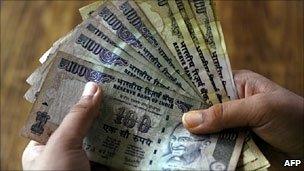India lost $462bn in illegal capital flows, says report
- Published

India's underground economy accounts for 50% of GDP, the report says
India has lost more than $460bn since Independence because of companies and the rich illegally funnelling their wealth overseas, a new report says.
The illegal flight of capital through tax evasion, crime and corruption had widened inequality in India, it said.
According to the report from US-based group Global Financial Integrity, the illicit outflows of money increased after economic reforms began in 1991.
Many also accuse governments and politicians of corruption in India.
Shadow economy
Global Financial Integrity, which is based in Washington, studies and campaigns against the cross-border flow of illegal money around the world.
It said that the "poor state of governance" had been reflected in a growing underground economy in India since Independence in 1947.
Global Financial Integrity director Raymond Baker said the report "puts into stark terms the financial cost of tax evasion, corruption, and other illicit financial practices in India".
Some the main findings of the report are:
India lost a total of $462bn in illegal capital flows between 1948, a year after Independence, and 2008.
The flows are more than twice India's external debt of $230bn.
Total capital flight out of India represents some 16.6% of its GDP.
Some 68% of India's capital loss has happened since the economy opened up in 1991.
"High net-worth individuals" and private companies were found to be primary drivers of illegal capital flows.
The share of money Indian companies moved from developed country banks to "offshore financial centres" (OFCs) increased from 36.4% in 1995 to 54.2% in 2009.
The report's author, Dev Kar, a former International Monetary Fund economist, said that almost three quarters of the illegal money that comprises India's underground economy ends up outside the country.
India's underground economy has been estimated to account for 50% of the country's GDP - $640bn at the end of 2008.
'Under-estimate'
Mr Kar used a World Bank model to calculate India's missing billions.
He compared India's recorded sources of funds, such as foreign direct investment and borrowing, and its recorded use of funds, like foreign currency reserves and deficit financing.
Illegal outflows are considered to exist when funds recorded exceed those used. India's exports and imports over the past six decades were also taken into account.
Adjusted for inflation, that all added up to $213bn missing since 1948. Taking estimated investment returns into account, Mr Kar calculated that was worth $462bn in today's money.
The figure could be much more, he warned, as it did not include smuggling and cash transfers outside the financial system.